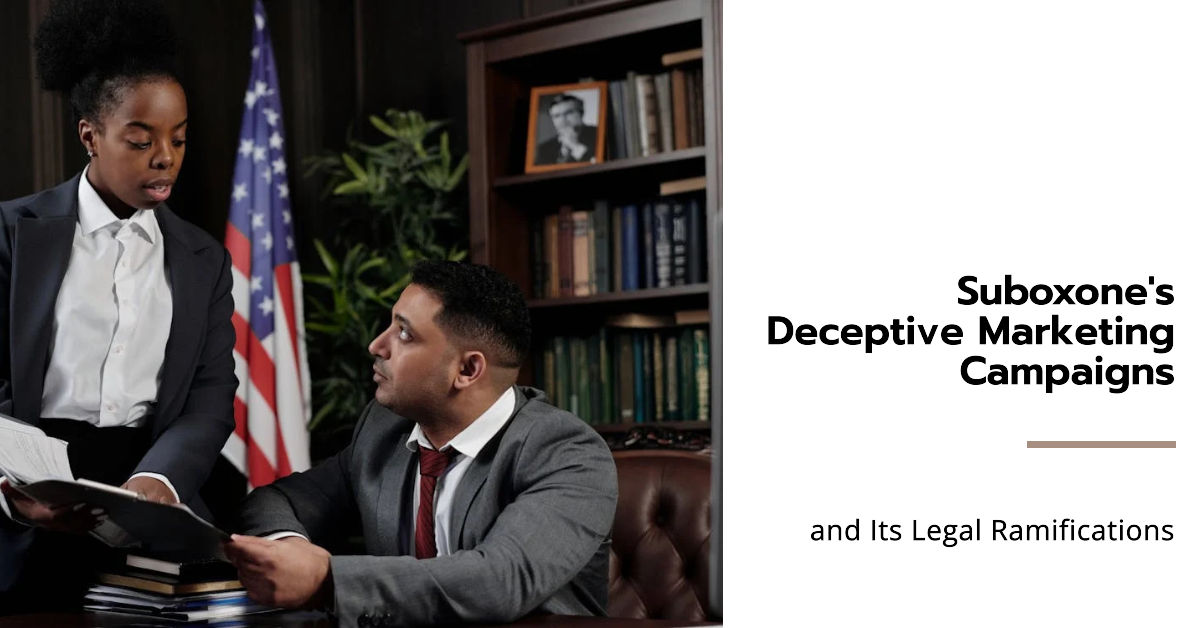Suboxone, a medication intended to aid in opioid addiction treatment, has found itself embroiled in legal battles due to alleged deceptive marketing tactics. Despite its intended purpose, Suboxone has been linked to serious dental problems, prompting a wave of lawsuits against the company.
In this article, we will dive into the deceptive marketing strategies employed by Indivior and the resulting legal consequences.
Indivior’s Marketing Ploys
Indivior, the manufacturer of Suboxone, employed various marketing strategies to position its product as superior to alternative opioid addiction treatments.
Through aggressive marketing campaigns, the company sought to sway healthcare providers and consumers, emphasizing Suboxone’s perceived benefits while downplaying its risks. Allegedly, Indivior misled stakeholders by presenting incomplete or misleading information regarding the drug’s safety profile.
For instance, Indivior faced legal action for its role in promoting Suboxone as safer and less addictive than similar medications. This deceptive marketing campaign allegedly contributed to a false perception of Suboxone’s risks among healthcare professionals and patients, ultimately leading to widespread use.
The Legal Wave Against Suboxone
The surge in Suboxone lawsuits stemmed from the emergence of serious dental problems among users, which were allegedly linked to the drug’s acidic nature. TorHoerman Law notes that plaintiffs filed lawsuits against Indivior, claiming that the company failed to adequately warn about the dental risks associated with Suboxone.
The Suboxone tooth decay lawsuit gained momentum following the consolidation of cases into multidistrict litigation (MDL), indicating the scale of the legal proceedings.
Lawsuit Legal News notes that one case involved David Sorensen, who filed a lawsuit after experiencing permanent damage to his teeth after using Suboxone. These lawsuits highlight the significant impact of deceptive marketing practices on consumers’ health and well-being.
Settlements and Consequences
Indivior faced substantial legal repercussions as a result of its deceptive marketing tactics.
According to Reuters, the company settled Suboxone monopoly lawsuits for $385 million, addressing allegations of anticompetitive behavior. Additionally, Indivior agreed to a $30 million federal antitrust settlement related to lawsuits filed by health plans.
These settlements underscore the financial ramifications of Indivior’s actions and highlight the company’s efforts to resolve legal disputes. However, the legal battles surrounding Suboxone are far from over, with ongoing litigation seeking compensation for individuals harmed by the drug’s dental side effects.
Impact on Consumers
The consequences of Indivior’s deceptive marketing campaigns have been profound for consumers, particularly those who experienced dental problems after using Suboxone. Plaintiffs in Suboxone lawsuits have reported a range of dental issues, including cavities, tooth decay, and tooth loss, necessitating extensive dental procedures.
These individuals have faced not only physical discomfort but also emotional distress and financial burdens associated with dental treatments. The impact on consumers underscores the importance of holding pharmaceutical companies accountable for their actions and ensuring adequate warnings about potential risks.
Government Action on Suboxone
In response to the revelations about Suboxone’s dental risks and Indivior’s marketing practices, regulatory agencies such as the FDA have taken action. According to Public Citizen, the FDA added warnings for dental problems to Suboxone’s prescribing information and patient medication guide in January 2022.
This action was pivotal in recognizing the necessity for heightened awareness regarding these risks among both healthcare providers and patients.
However, questions remain about the effectiveness of regulatory oversight in preventing similar incidents in the future. The Suboxone saga highlights the challenges of balancing access to treatment with ensuring patient safety in the pharmaceutical industry.
Legal Options for Those Affected
Individuals affected by Suboxone-related dental issues are encouraged to seek legal recourse by consulting experienced attorneys specializing in pharmaceutical litigation. Legal professionals can provide guidance on the process of filing a lawsuit against Indivior and pursuing compensation for damages.
Due to the intricate nature of these cases and differing state deadlines, affected individuals must promptly seek legal counsel for proper guidance. A thorough evaluation of each case by knowledgeable attorneys can help determine the best course of action for pursuing justice.
Reflections and Reforms
The Suboxone controversy serves as a stark reminder of the importance of transparency, accountability, and ethical marketing practices in the pharmaceutical industry. It underscores the need for robust regulatory oversight to prevent deceptive marketing tactics and protect consumers from harm.
Moving forward, stakeholders must learn from the mistakes made in the Suboxone case and work towards implementing reforms that prioritize patient safety. By holding pharmaceutical companies accountable for their actions and promoting greater transparency in drug marketing, we can strive to prevent similar incidents.
FAQs
What is the Suboxone lawsuit?
The Suboxone lawsuit involves allegations against manufacturer Indivior for failing to adequately warn about dental complications linked to Suboxone use. Plaintiffs seek compensation for tooth decay, oral infections, and other dental problems allegedly caused by the medication.
Does Suboxone cause tooth decay?
While Suboxone’s exact role in tooth decay remains unclear, some users have reported experiencing dental issues such as cavities and tooth loss. Allegations in lawsuits suggest a potential link between prolonged Suboxone use and adverse dental outcomes.
What class of drug is Suboxone?
Suboxone is classified as a partial opioid agonist medication containing buprenorphine and naloxone. It is used in the treatment of opioid dependence, acting to reduce withdrawal symptoms and cravings while minimizing the risk of misuse and overdose.
In conclusion, the Suboxone controversy highlights the profound impact of deceptive marketing practices within the pharmaceutical industry. It underscores the urgent need for transparency and ethical conduct to safeguard consumer welfare. Legal battles and regulatory responses underscore the imperative of accountability and patient-centric approaches.
Looking forward, comprehensive reforms are imperative to uphold ethical standards and ensure drug safety. The Suboxone saga serves as a reminder of the importance of prioritizing transparency and integrity across all stages of drug development, marketing, and regulation.
Through collaborative efforts, we can cultivate a healthcare environment that prioritizes patient well-being, fostering trust and accountability within the industry.

